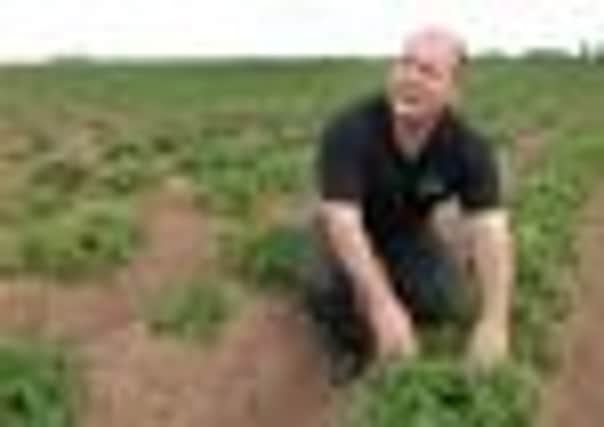Farm of the week: Family giving its best shot at new venture


From farm shops to riding gallops to bed and breakfast accommodation, I have seen a variety of well organised and successful businesses operating on the region’s farms that complement the agricultural production.
The move into different areas of business is not just due to the entrepreneurial spirit of farmers, it is also due to the necessity of creating a stable income for the region’s food producers who have time and time again been faced with market volatility and huge increases in overheads.
Advertisement
Hide AdAdvertisement
Hide AdAn example of just how much a well-run farming business can become is to be found from the owners of Pollington Grange Farm at Pollington, near Goole.
Run by Tom Bayston in partnership with his parents Rachel and William, Pollington Grange Farm is home to a mainly arable operation, winter wheat, winter barley, oilseed rape and sugar beet. Mr Bayston also runs a separate business growing potatoes alongside his business partner Tim Carr.
However, the turbulent state of farming a few years ago led the family to begin looking for a new avenue for generating income.
Mr Bayston’s love of shooting led him and the family to look towards creating a shooting ground, with the plan coming to fruition a few years ago.
Advertisement
Hide AdAdvertisement
Hide AdBased five miles away by road and three miles away cross country from the farm, the business allows visitors to take shots at clay pigeons and is aimed predominantly at the corporate market.
The day before my visit Mr Bayston tells me the shooting ground welcomed a party of company bosses from as far away as the USA and Sweden.
The move was not one the family took lightly, with Mr Bayston explaining that at least two years’ research went into the project. Once planning permission was granted they were able to get the scheme up and running.
Currently, the Park Lodge Shooting School is open five days a week and provides three people with full-time employment and four people part-time.
Advertisement
Hide AdAdvertisement
Hide AdThe two instructors at the shooting ground are also farmers, one from York and one from Barnsley.
As well as supporting the rural economy, the shooting ground is also helping to preserve one of the countryside’s finest traditions.
“I was a keen rugby player for many years,” said Mr Bayston.
“When I got injured I was given some shooting lessons for Christmas and the interest came from there.”
Advertisement
Hide AdAdvertisement
Hide AdHe added that the instruction given at the ground was equally suitable for beginners as it was for experienced shooters.
The business was supported in its early days by the Growing Routes initiative, a scheme Mr Bayston has praise for. The diversification has proved so successful that plans are currently underway to construct a clubhouse on the site to augment the operation.
The new clubhouse will, when completed, feature a retail area, coffee shop, lounge and training rooms.
Today Mr Bayston divides his time between the farm and the shooting ground, which he says has provided a successful extra income for his business and left him less prone to the unpredictably of agriculture.
Advertisement
Hide AdAdvertisement
Hide AdBy way of example half of the farm’s sugar beet crop was lost last year due to the poor weather.
Pollington Grange Farm is home to varying soil types, as diverse as limestone, heavy clay and so-called ‘egg-timer’ soil.
Also the farm has started to produce a suckler herd, with limousin, Belgian blue and dexter cattle now being reared on the farm with a view to supplying the shooting clubhouse with a line of home-reared meats.
“That’s what Joe Public likes,” Mr Bayston said. “They want to know where the food they eat comes from.”
Advertisement
Hide AdAdvertisement
Hide AdMr Bayston has been involved in farming his entire life. An alumnus of Bishop Burton College, he worked in Australia for a period before returning to Yorkshire to work at Pollington alongside his family.
Pollington Grange Farm was home to pigs and cattle up until around 2001 when a combination of the foot and mouth outbreak and poor markets led to the family deciding to come out of it all together.
Concentrating chiefly on arable for the last few years has improved matters.
He has recently become involved with the Wold Marsh Group, which is increasing its inroads into Yorkshire having proved successful in Lincoln- shire.
Advertisement
Hide AdAdvertisement
Hide AdThe farm, more than 1,000 acres in size, is also keen on promoting wildlife, with 3km of hedgerows having been planted to increase habitats for birds.
Today lapwings, grey partridges, pheasants and sparrows can all be found at the farm.
Despite the busy schedule Mr Bayston also sits on two drainage boards, something born out of his deep dedication to the vocation that is farming.
“I really enjoy it,” he said. “I enjoy the job and I enjoy the people who work in the industry.
Advertisement
Hide AdAdvertisement
Hide Ad“I would still like to grow the business, whether that means buying or renting, I don’t know.”
Naturally setting a business based around guns presented more than the usual set of pitfalls when it came to gaining the relevant consents and planning permission needed to establish a business.
Mr Bayston added that property consultants Carter Jonas had been “fantastic” in the assistance it provided in terms of helping with securing planning permission and getting the diversification up and running.
More information can be found at www.parklodgeshootingschool.co.uk.